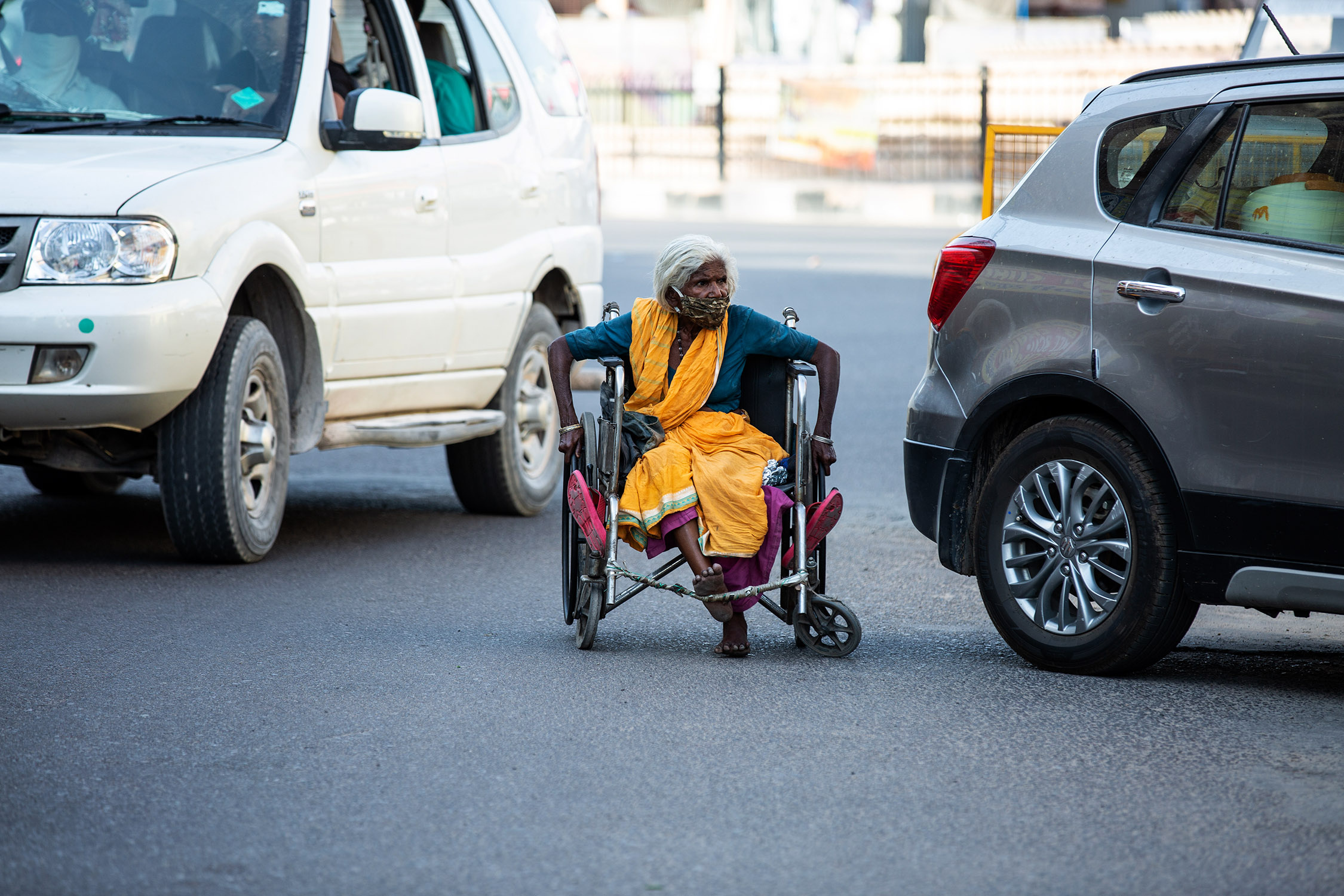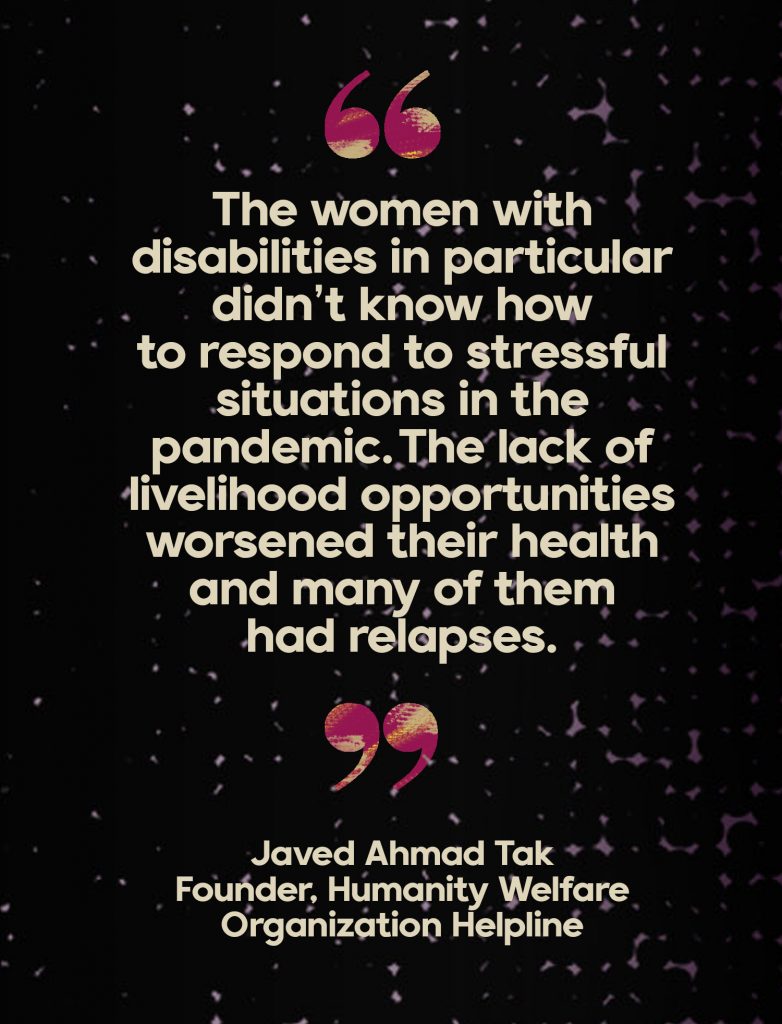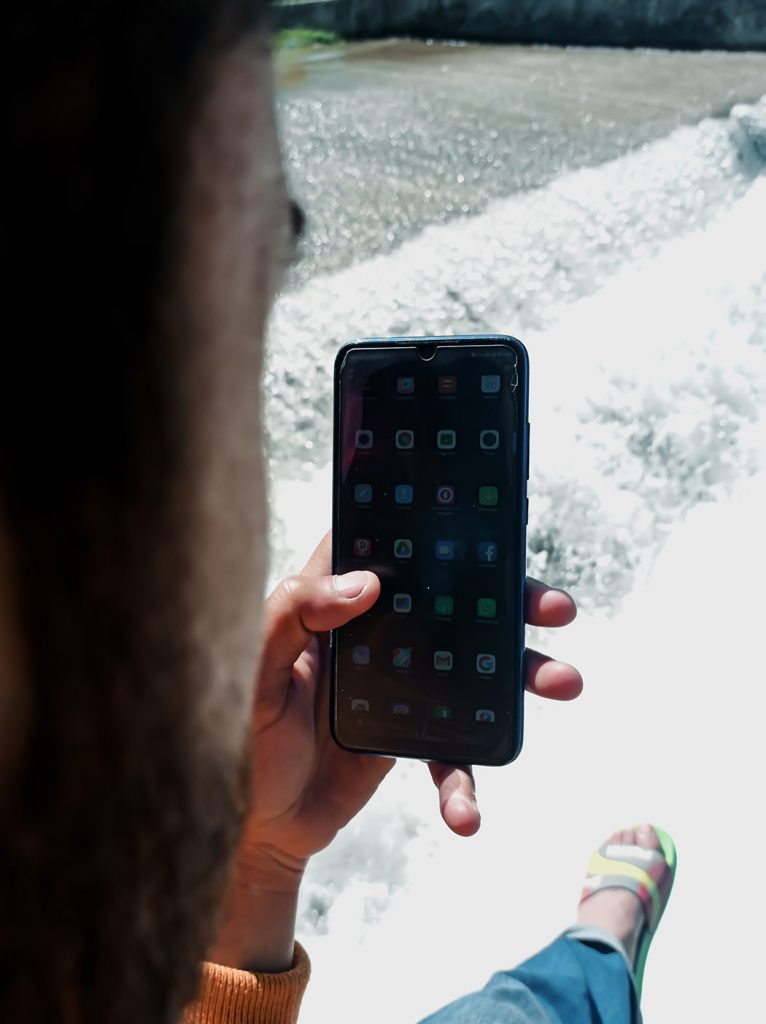Urfi Jan is anything but a quitter. At the age of three, her ability to walk began to deteriorate after she developed a fever. She soon ended up not being able to walk altogether, but she has since endured several surgeries to be able to move with less support from others. Now 30, and still unable to walk without a cane, she has earned a bachelor’s degree, and also has certificates on technical sewing and computer application tucked under her belt. Her being mostly homebound affected her search for work, however, and so last year she started laying out plans to put up a boutique that would sell clothes she would design.
Then COVID-19 struck and the lockdowns began.
“The pandemic further caged our lives,” says the Kashmir native, referring to those with disabilities like her. “We couldn’t visit any health care centers or make any purchases on our own due to social distancing protocols. It was really embarrassing to ask the male members in our family to buy items of personal hygiene for us.”
About 2.2 percent of India’s 1.4 billion people have either physical or mental disabilities. Of this, 11.8 million are women who can be said to have twice the chances of being discriminated against: First, precisely because they are women. Second, because they have disabilities.

Women in patriarchal India and India-administered Kashmir already suffer discrimination simply by being women, and more so if they have disabilities. This dire situation stems from a host of factors that go beyond gender.
In patriarchal India, women occupy a lower status than men, and are usually expected to give priority to the family at all times. They are also less likely to be hired when there are male applicants for the same position, and tend to be paid less than men should they be lucky enough to land a job.
The situation is even worse for women with disabilities in this country, the majority of whom are found in the low-income groups, according to the National Center for Promotion of Employment for Disabled People (NCPEDP). In its 2020 study Locked Down and Left Behind, NCPEDP also notes, “Women with disabilities face the added burden of intersectional discrimination. They face layers of prejudice that stem from gender, poverty, lack of education, and social prejudice. Often denied sexual and reproductive rights, they are at greater risk of sexual assault and violence.”
From worse to worst
All these have been amplified during this pandemic, which has forced governments across the world to impose lockdowns and restrict the movement of people. India has been no different, with the central government implementing a nationwide lockdown that lasted for four months — from March till July — last year.
This year, states across the country imposed their own lockdowns. Here in Indian-administered Kashmir, some 859km north of Delhi, the lockdown lasted from April to June, and is still implemented during weekends.
For people with disabilities who live alone, this has meant going for days without caregivers and has forced them to fend for themselves the best they can. Those who are more mobile find it harder to go anywhere with less public transportation available; unlike before, too, they can no longer ask help from people they meet outside because of social-distancing protocols.

Shahzada, who has a mental condition, says that during the lockdown, she became disconnected from everyone and had nothing to eat for days.
“I had nobody to talk to and I was afraid to visit any of my relatives home,” says the 70-year-old who doesn’t have a last name and lives by herself. “I didn’t want to create problems for them. I take lot of medicines already and my health is not that good.”
Masooda Begum, 45, meanwhile says, “This (pandemic) was the time when I wished that the floor would open and swallow me.” Born with a disability that affects her mobility, Begum relies on her married younger sister to help her do even the simplest of tasks — from eating to bathing, to taking medicines. Begum says that she feels sorry for her sister, who has an infant and another child that she cannot give her full attention to, as she juggles her responsibilities between two households every day.
Having no choice but to be dependent on others for care is like dying a thousand deaths, says Begum. She knows only too well that pandemic restrictions have given her sister, who lives with her in-laws a few kilometers away, a heavier burden.
Rarely with visitors aside from her sister even before the pandemic, Begum now has to spend increasingly longer hours alone as she waits for her sister to come. Their parents, who had been Begum’s primary caregivers, had passed away a few years ago.
“Everyone was afraid to visit me in the lockdown,” says Begum in a corner of her kitchen, where she stays all the time. “We are treated in a way as if we are the virus. We take a lot of medicines and are mostly sick, that is why people fear us.”
Javed Ahmad Tak, founder of Humanity Welfare Organization Helpline, has also noticed that here in Kashmir, most of the women with disabilities couldn’t get a vaccine due to lack of awareness and special drives for them to have access to healthcare centers.
UN Women itself observed in a 2020 briefing paper on women with disabilities and COVID-19: “(Given) the unprecedented nature of this crisis, there is a considerably high volume of crucial information that is being shared with the public regarding restrictions on movement, public health information, and policy changes. Reliable information about these changes is not always provided in a variety of formats and accessible places, including via sign language interpretation, plain language formats, on TV and radio, on social media, and in public displays and posters, meaning that women, girls, non-binary, and TGNC (Transgender and Gender Nonconforming) persons with disabilities may not have access to this information.”
Hopes on pause
In the meantime, all of the activities that gave hope to people with special needs stopped due to the strict lockdown in the region.
Says Tak, who has been working on the rights of persons with disabilities in Jammu and Kashmir for over two decades now: “The women with disabilities in particular didn’t know how to respond to stressful situations in the pandemic. The lack of livelihood opportunities worsened their health and many of them had relapses of the various problems for which they were already taking therapies or counseling, having medicines, or taking skill trainings.”

He says that before the pandemic and the lockdowns, many of these women “would take small orders from home and do artisan, stitching, or other informal work from home to survive. But the lockdown shattered everything and (left) them helpless and more vulnerable.
Homemaker Haleema Jan is now even worried over what lies ahead for her 16-year-old daughter Irtiza, who was born with hearing and speech disabilities.
“We wanted our daughter to become independent through education,” says Haleema. “But at home she gets mostly stressed and is not able to use this phone properly to study due to her own weakness.”
Based on figures in a recent report run by The Tribune e-paper, about 70 percent of the 156,319 women with disabilities in Jammu and Kashmir are illiterate. More than 360,000 people in Jammu and Kashmir have disabilities, of whom some 43 percent are women.
Interestingly, Irtiza, communicating through sign language through her teacher Shazia Akhtar, expresses frustration over the current restrictions. Her family doesn’t allow her to leave the house as they are worried about her safety due to her condition.
According to the 10th grader at Zaiba Appa’s, a local school for underprivileged children with disabilities, she receives her online classes through video calling from her teachers, where they communicate through sign language. But that is only possible with good internet connectivity, which is intermittent in Kashmir. Irtiza also says that no one is able to help her with online classes at home, as the members of her family are not educated. Akhter says that most of the families of their students do not have smartphones or internet; some of them don’t even know how to use either. She says that because of the pandemic, teachers of the school can no longer personally visit their students at home for counselling.
“The lockdown has delayed the learning and other crucial skills for the children with various disabilities,” Akhter adds. “It gets very difficult for us to counsel parents and make them understand the importance of the online classes.”
Akhter’s job, though, may interest Urfi Jan, who has been unable to get her clothes boutique idea going just yet. Jan says that she has always been keen to teach, as well as to help motivate women like her to keep going despite any obstacle. As soon as things get better, says Jan, she is determined to do something. She isn’t clear yet about what that would be, but she is sure she will be standing up, her cane in one hand, and get busy.
“I don’t focus much on what I can’t do,” says Jan. “It doesn’t matter how slowly I go. But I am determined to keep going with small steps. I want to make a difference in the lives of people by encouraging them not to be afraid and use their abilities in the best possible ways.●
Aliya Bashir is an independent journalist covering India and Indian-administered Kashmir, with a focus on human rights, gender justice, and women’s issues.



















